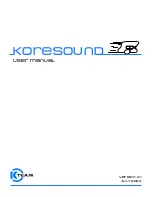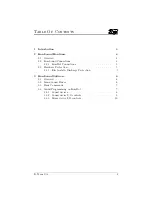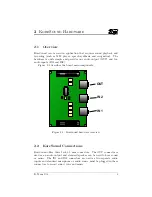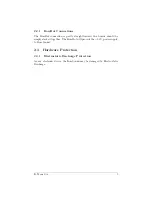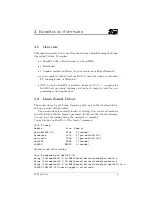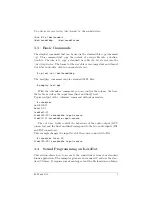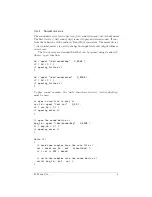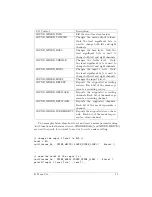
3
KoreSound Software
3.1
Overview
This chapter presents how to use KoreSound from a KoreBot using the Linux
Operating System. It requires:
•
a KoreBot (with a KoreConnect or a KoreSDK)
•
a KoreSound
•
a terminal emulator software (such as minicom or HyperTerminal)
•
a host computer with at least one RS-232 connector (such as a standard
PC running Linux or Windows)
•
GNU tools for KoreBot (assembler, linker and C/C++ compiler for
Intel XScale processor) running on your host computer (only for pro-
gramming sound application)
3.2
Linux Sound Driver
The sound driver for the Linux Operating System is in the standard distri-
bution provided with KoreBot.
The sound driver is normally loaded at startup. You can see all modules
actually loaded with the ’lsmod’ command. In the case the driver is missing,
you can force the loading using the ’modprobe’ command.
Typical output on KoreBot of the ’lsmod’ command:
/bin # lsmod
Module
Size
Used by
pxa-uda1342-i2c
2504
0 (unused)
soundcore
4072
2 [pxa-uda1342-i2c]
pxa-audio
7456
0 [pxa-uda1342-i2c]
uda1342
2968
0 (unused)
otg243
84832
0 (unused)
Manual sound driver loading:
/bin # modprobe pxa-uda1342-i2c
Using /lib/modules/2.4.19-kb8/kernel/drivers/sound/pxa-audio.o
Using /lib/modules/2.4.19-kb8/kernel/drivers/sound/soundcore.o
Using /lib/modules/2.4.19-kb8/kernel/drivers/sound/pxa-uda1342-i2c.o
PXA25X UDA1342 I2C audio support initialized
K-Team S.A.
6

